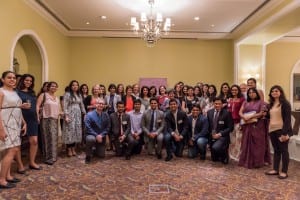UCL in India: strengthening partnerships
By Sophie Vinter, on 15 April 2016
 Academics from across UCL joined Vice-Provost (International) Dame Nicola Brewer on a major recent scoping visit to India.
Academics from across UCL joined Vice-Provost (International) Dame Nicola Brewer on a major recent scoping visit to India.
Representatives from the fields of engineering, population health sciences, management, architecture and education met with leading public and private higher education institutions, top private schools, charitable foundations and UK and Indian government bodies during the visit.
At a time of strengthening ties between the UK and India, the group visited Bangalore, Pune, Mumbai and Delhi between 29 March and 12 April.
Alumni receptions in the latter two cities attracted over 50 alumni at each – twice the number than at previous events.
Interdisciplinary approach
The aim of the visit was to review UCL’s current engagement with India and to investigate new opportunities in line with the Global Engagement Strategy (GES).
Lesley Hayman, Head of Global Partnerships, said: “The response to UCL’s visit was clear – there was considerable enthusiasm for working with UCL in all the sectors represented and more, both from our existing partners and those that we met for the first time. Several of the charitable foundations we visited expressed an interest in partnering with us for joint research and capacity building.
“Many of our discussions centred on how an interdisciplinary approach combining education, engineering for development and child health could tackle long-standing community problems effectively.”
Long-term partnerships
Among organisations visited during the trip was the Mumbai-based Society for Nutrition, Education and Health Action (SNEHA), with whom Professor David Osrin from UCL’s Institute of Global Health has been working in the Dharavi slums for over a decade.
Through their long-term partnership, they are successfully helping to improve children’s health and reduce gender-based violence.
Lesley added: “There were many lessons to be learnt from the project, not least that it takes years to build up trust and to effect change at the community level.
“Although the work with SNEHA predates the GES, it is a living example of how co-creating wise solutions to global problems can work in action.”
The delegation left India with a strong list of contacts and ideas from which they hope to build future collaborations.
5 Responses to “UCL in India: strengthening partnerships”
- 1
-
2
lorihoulihan13 wrote on 4 May 2016:
RT @UCL_Global: Take a look at the highlights video from @UCL_Global recent visit to #India: https://t.co/miaHGAdDUT @UCLAlumni
-
3
UCLAlumni wrote on 4 May 2016:
RT @UCL_Global: Take a look at the highlights video from @UCL_Global recent visit to #India: https://t.co/miaHGAdDUT @UCLAlumni
-
4
DavidPriceUCL wrote on 4 May 2016:
RT @UCL_Global: Take a look at the highlights video from @UCL_Global recent visit to #India: https://t.co/miaHGAdDUT @UCLAlumni
-
5
Strengthening UK-India industry collaborations: UCL hosts UUK high-level roundtable | UCL UCL Global wrote on 13 July 2016:

[…] this year Dame Nicola led a cross-institutional scoping visit to Pune, Mumbai and Delhi, with academics from four Faculties at […]
 Close
Close


Take a look at the highlights video from @UCL_Global recent visit to #India: https://t.co/miaHGAdDUT @UCLAlumni